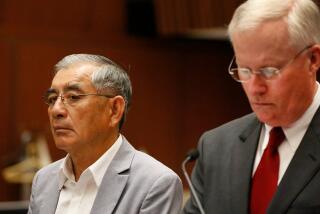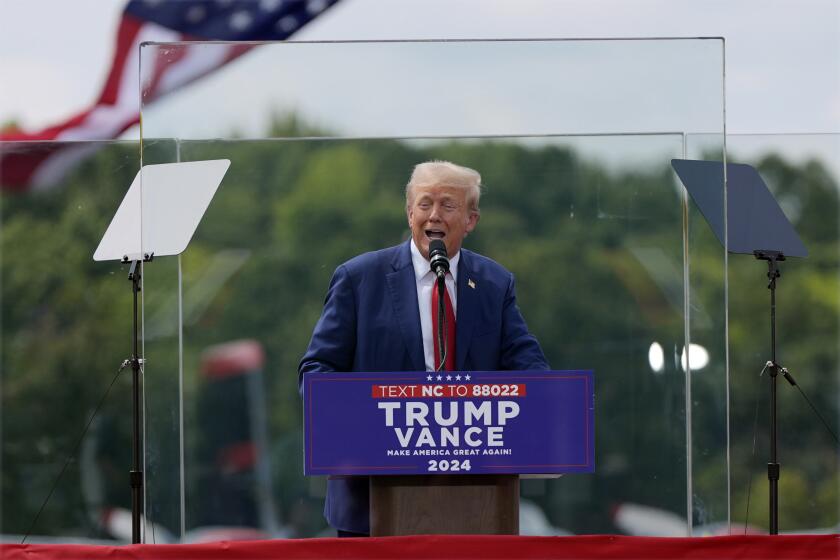New York proposes tough rules on campaign disclosure
WASHINGTON — The push by states to force politically active nonprofits to disclose their financial backers ratcheted up Wednesday as New York’s attorney general proposed tough rules that could require many such tax-exempt groups to publicly report their political budgets and donors.
The regulations, which Atty. Gen. Eric T. Schneiderman plans to issue in spring after a public comment period, could affect some of the biggest outside groups that engage in federal political campaigns, including Americans for Prosperity, the League of Conservation Voters, the National Rifle Assn. and NARAL Pro-Choice America.
Since 2010, such longtime political players have been joined by an array of new “social welfare” organizations that cropped up following the Supreme Court’s Citizens United ruling, which lifted the ban on independent political spending by corporations, including such nonprofits.
Tax-exempt groups reported to the Federal Election Commission that they spent more than $300 million on federal races in the 2012 campaign, almost a third of the total that all outside groups reported spending. But their true influence was far greater, as nonprofits pumped hundreds of millions more into television ads and other campaign-related activity that was not required to be disclosed.
So far, nonprofit groups have operated largely free from the reporting rules governing political committees, as efforts by campaign finance reform advocates to pass federal measures mandating more transparency have failed. But regulators in several states that have their own disclosure rules are stepping into the void. Last month, California’s Fair Political Practices Commission forced an Arizona-based group to reveal the source of $11 million it gave for two California ballot initiative campaigns.
The rules proposed by Schneiderman, who has broad authority over the regulation of nonprofits in New York, are the most expansive yet.
“New York is kind of blazing the trail here for states and the federal government about how to go forward on disclosure,” said Craig Holman, government affairs lobbyist for Public Citizen, one of the pro-reform groups that cheered the move.
The regulations would require nonprofits that spend at least $10,000 a year on New York state and local elections to report all their political expenditures, as well as all contributors who give at least $100. The rules would apply to any group engaged in election-related activity within six months of a New York election, whether on television or the Internet, through the mail, or even by a grant to another organization.
“When people spend money to try to influence our elections, the public needs to know where that money is coming from and how it is being spent,” Schneiderman said in a statement. “Nonprofits should not be used to subvert that basic principle. Simply put, transparency reduces the likelihood of corruption.”
The proposed rules provide two disclosure exemptions: for donors who restrict their contributions to nonpolitical activity and for those who get a waiver from the attorney general’s office after demonstrating that revealing their identity could lead to harassment or reprisals.
The regulations would affect not only groups active in New York politics, but also major national organizations that raise money from donors in the state.
Under state law, any nonprofit that raises or spends at least $25,000 in New York has to register with the attorney general’s charities bureau. The new regulations would require such groups to report how much of their budgets go to local, state and federal political activity. They would have to disclose their donors only if they spent money on state or local elections.
“The new disclosure rule is probably one of the broadest we’ve seen anywhere in the country,” said Jason Torchinsky, a Virginia-based campaign finance attorney who has represented conservative nonprofits in fights against disclosure laws around the country. “This hits everyone across the spectrum.”
Advocates on both sides expect the New York regulations will be challenged in the courts.
“States often frankly try to go too far, and I expect there are going to be constitutional issues with something like that,” said Tim Phillips, president of Americans for Prosperity, a Virginia-based conservative advocacy group that was part of a robust campaign by outside groups against President Obama’s reelection.
Americans for Prosperity spent more than $190 million in the 2012 cycle, Phillips said, but it does not have to report its donors and must file only limited information to the election commission about its expenditures. The proposed rules would require the group, as a registered nonprofit in New York, to report how much it spends on all local, state and federal campaigns. If it spends $10,000 or more on local or state campaigns in New York, it would have to disclose its contributors and detailed political expenditures.
Barring a legal challenge, the new rules are expected to take effect in New York in time for the 2014 election.
Also Wednesday, New York Gov. Andrew Cuomo said he would seek to pass an even broader law that would require donor disclosure from any person or entity engaged in campaign activity in the state.
“If it’s activity in the state of New York, I want it covered,” he said in an interview with NPR affiliate WXXI. “I don’t care if you’re registered in New York or if you’re registered in Timbuktu.”
More to Read
Sign up for Essential California
The most important California stories and recommendations in your inbox every morning.
You may occasionally receive promotional content from the Los Angeles Times.










